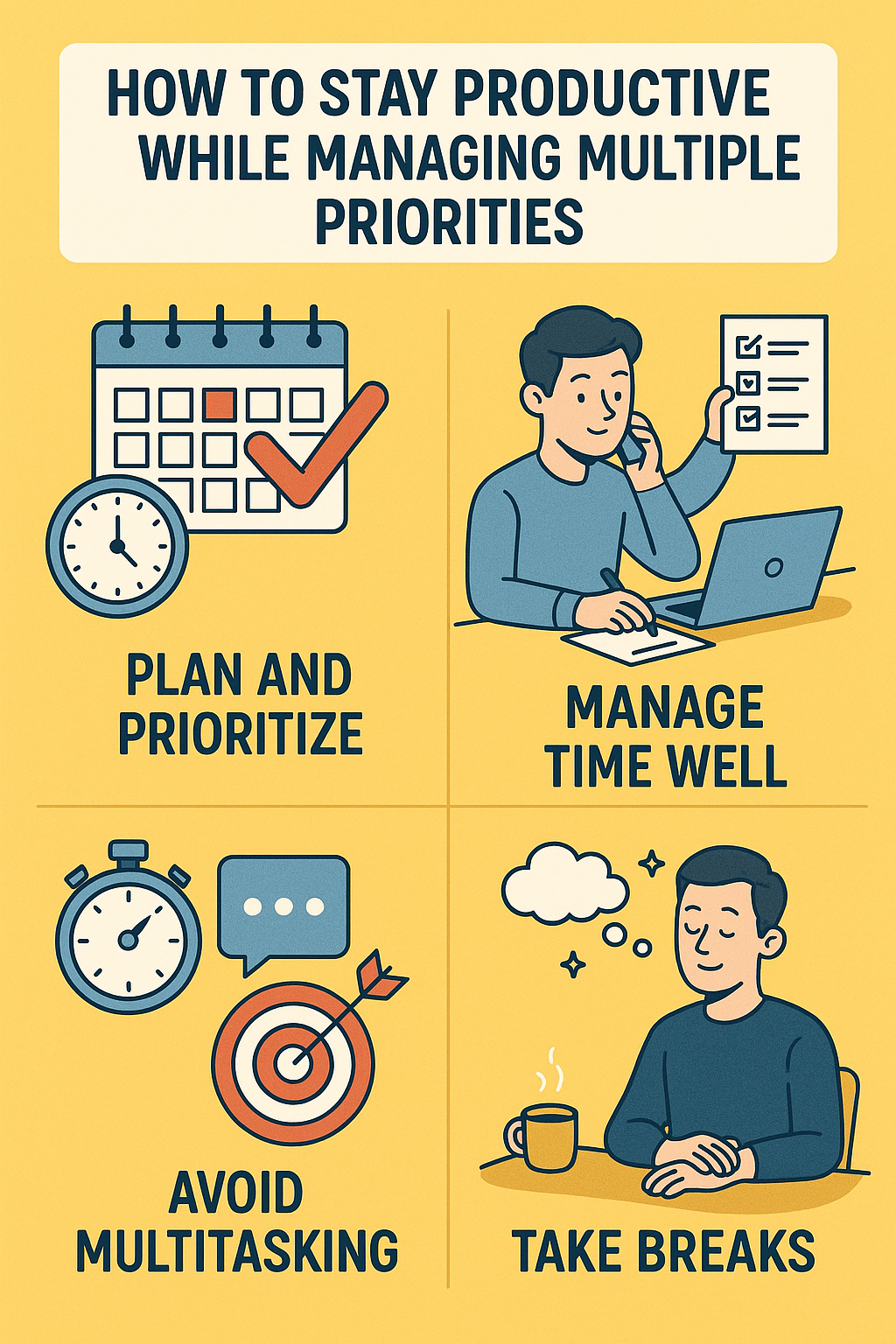In today’s busy world, managing multiple priorities at once is often a necessity. Whether you’re juggling work projects, personal commitments, or side ventures, it’s easy to become overwhelmed when trying to balance everything. However, with the right strategies, you can stay productive and keep all of your responsibilities in check without burning out. In this article, we’ll explore practical tips to help you stay productive while managing multiple priorities.
1. Prioritize Your Tasks
The first step in staying productive when managing multiple priorities is prioritization. When you have many tasks to juggle, it’s important to identify which ones are most urgent and important. By prioritizing, you can focus on what matters most and avoid getting distracted by less important tasks.
Tip: Use the Eisenhower Matrix to categorize tasks by urgency and importance. Tackle high-priority tasks first, and delegate or defer tasks that are less urgent.
2. Break Down Large Tasks into Smaller Steps
When you’re working on multiple tasks, some may seem too overwhelming or complex to tackle. Breaking larger tasks into smaller, more manageable steps helps reduce the feeling of overwhelm and allows you to make steady progress. Completing smaller steps will build momentum and keep you moving forward.
Tip: Break your larger goals into actionable sub-tasks with clear deadlines. Focus on completing one small task at a time to prevent feeling stuck.
3. Time-Block Your Day
Time-blocking is a technique that involves allocating specific blocks of time to different tasks or projects throughout your day. This helps you stay organized, ensures that each priority gets the attention it needs, and prevents you from spending too much time on any one task.
Tip: Use a planner or digital calendar to schedule specific time blocks for each task or project. During each block, focus solely on that task, and avoid multitasking to stay productive.
4. Learn to Say No
One of the most important skills for managing multiple priorities is learning to say no. Taking on too many commitments can stretch you thin and compromise the quality of your work. It’s important to set boundaries and recognize when you don’t have the time or energy to take on more.
Tip: Be selective about the tasks or responsibilities you take on. Politely decline tasks that don’t align with your current goals or priorities, and don’t be afraid to ask for help when needed.
5. Use a Task Management System
Having a reliable system to keep track of your tasks and deadlines is essential when managing multiple priorities. A task management tool or to-do list helps you stay organized, prevents tasks from slipping through the cracks, and ensures you’re staying on track with your responsibilities.
Tip: Use a task management app like Todoist, Asana, or Trello to organize and track your tasks. Set reminders and deadlines to stay on top of your responsibilities.
6. Focus on One Thing at a Time
Multitasking may seem like a time-saving strategy, but it can actually reduce productivity and the quality of your work. Focusing on one task at a time helps you give each task your full attention, leading to better results and a sense of accomplishment.
Tip: Practice single-tasking by dedicating focused time blocks to one project or task at a time. This minimizes distractions and allows you to give your best effort to each priority.
7. Take Regular Breaks
Taking breaks is essential for maintaining productivity, especially when managing multiple priorities. Working non-stop without breaks can lead to burnout, decreased focus, and reduced performance. Regular breaks help you recharge, maintain mental clarity, and stay energized.
Tip: Use techniques like the Pomodoro Method, which encourages working for 25 minutes followed by a 5-minute break. Use your breaks to stretch, take a walk, or engage in a relaxing activity to reset your mind.
8. Delegate When Possible
Delegation is a powerful tool for managing multiple priorities. It’s not always necessary for you to handle everything on your own. By delegating tasks to others, you free up your time to focus on higher-priority responsibilities and prevent yourself from becoming overwhelmed.
Tip: Identify tasks that can be delegated to team members or colleagues. Provide clear instructions and set expectations to ensure that delegated tasks are completed successfully.
9. Stay Organized
Staying organized is essential when managing multiple priorities. A cluttered workspace or disorganized schedule can lead to confusion and mistakes. Organizing your workspace, tools, and calendar ensures that everything is in place, which makes it easier to stay focused and productive.
Tip: Keep your workspace clean and decluttered. Use folders, labels, and digital tools to organize your materials and documents, and review your calendar regularly to stay on top of deadlines.
10. Practice Self-Care
Balancing multiple priorities can be stressful, and neglecting your health can lead to burnout. Prioritizing self-care is essential for maintaining your energy, focus, and well-being. When you take care of yourself, you’re better equipped to manage your tasks and responsibilities.
Tip: Make time for exercise, healthy meals, sleep, and relaxation. Schedule regular self-care activities into your routine to prevent stress and maintain a sustainable work-life balance.
